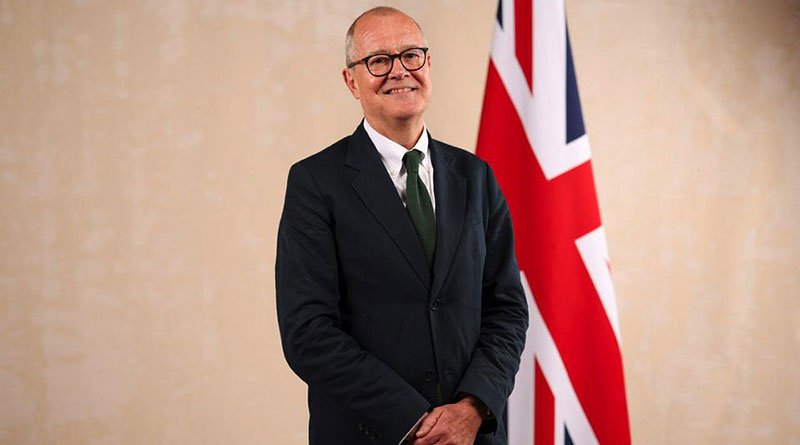
Advances In Science Set To Transform Treatments For People Living With Dementia
New solutions to dramatically increase the number of patients receiving a timely formal diagnosis of dementia are to be rolled out by the end of the decade, Science Minister Lord Vallance has said.
With one million people in the UK living with dementia – a number expected to rise to 1.4 million by 2040 – researchers and industry have been backed by £5 million of initial funding to come up with ideas to improve the quality of life for those living with this devastating disease and ease pressure on the NHS.
The aim is that, by 2029, more than 92% of patients could be diagnosed within 18 weeks of a doctor’s referral – up from less than half currently.
Solutions could include ramping up work on blood tests that spot the build-up of proteins associated with dementia, or saliva analysis that notices hormone changes at the early stages of a fading memory, or even before symptoms have begun to show.
Other potential solutions could see the development of AI-powered daily routine assistants which work through smart speakers or tablet devices and learn the activities someone enjoys and their cognitive abilities – from suggesting brain training exercises, offering reminders for daily tasks, helping with simple cooking instructions or facilitating video calls with family.
With 1 in 4 acute hospital beds occupied by a person with dementia in England, these tools will help more people to get the care they need, when they need it, and in their community, supporting the NHS as we build a health service fit for the future.
The challenge was announced by Science Minister Lord Vallance on a visit to the UK Dementia Research Institute in Cambridge with Health Minister Zubir Ahmed, where they spoke to researchers working to tackle a disease that affects so many families across the country.
Science Minister Lord Vallance said:
“Few people in the UK will go through life untouched by the impact of dementia – whether through a personal diagnosis or in caring for, or coming to terms with, its effect on a loved one.”
“We must therefore grasp the opportunities that science and technology offers in getting people the early and effective diagnosis they need to continue living fulfilled lives while reducing the pressure on hospitals.
“Whether it involves advanced blood tests or home AI tools and much more besides, we’re setting a clear, measurable and ambitious target, challenging researchers to drive forward potentially game-changing discoveries to transform the lives of people across our country while building an NHS fit for the future and growing our economy.”
Health Minister Dr Zubir Ahmed said: “For too long, our health system has struggled to support those with complex needs, including the one million people living with dementia. This ambitious challenge represents a crucial step forward in our mission to build an NHS fit for the future.
“By harnessing the power of innovation to diagnose dementia faster and more accurately, we can ensure patients and their families get the support they need earlier, when it can make the greatest difference.
“Together, we will transform how we approach dementia care and give millions of people the chance of a better quality of life.”
The Dementia Patient Flow R&I Challenge is the third of 5 to be announced as part of the R&D Missions Accelerator Programme – backed by £500 million set out in the Spending Review. The programme, coordinated by UK Research and Innovation, marks the first time government has set clear, measurable and stretched targets for R&D to deliver its core missions – with more challenges to be unveiled in the coming months
The announcement also comes alongside further support for those with dementia, with UKRI announcing £1.2 million for 2 projects accelerating innovation in digital cognitive assessments. The funding will support Kneu Health – a University of Oxford spinout – in developing innovative smartphone-based cognitive assessment technology that combines digital testing with analysis of ‘biomarkers’ – molecules in the body which can indicate illness – to enable earlier, more accurate diagnosis of cognitive conditions. The biomarkers research is running via Dementias Platform UK’s READ-OUT study.
Professor Siddharthan Chandran, Director and CEO, UK Dementia Research Institute said:
“As a practising neurologist, I see first-hand the devastating impact that a long delay for diagnosis can have on an individual and their family. We’re now at an inflection point. The next five years will see a revolution in both therapeutics and diagnostics for dementia, and we’re already seeing the beginnings of that transformation today.
“Precise, early diagnosis isn’t just about giving people information, it’s about giving them agency, choice, and crucially, access to emerging clinical trials and treatments that offer real hope to slow down or stop these conditions. But we must ensure these advances reach all corners of society, through simple blood tests at the GP, digital assessments on your phone, and smart technology seamlessly woven into daily life.
“The UK has, arguably, the greatest cluster of world-leading researchers in this space, working in some of the best universities in the world, in partnership with industry and our NHS. This ambitious commitment will enable these brilliant scientists and clinicians to deliver the breakthroughs in tomorrow’s diagnostics that will transform the lives of people living with and at risk of dementia.”

